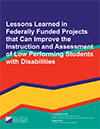Welcome
Welcome to the first NCEO e-newsletter. In this issue, we highlight the whirlwind of changes that we are all experiencing – the CCSS, the assessment consortia, shifting assessment policies, flexibility waivers, and more – and how they all relate to students with disabilities. We welcome feedback and ideas about what you would like to see in future issues of this quarterly e-newsletter.
A Time of Change: Transition and Transformation
Understanding how to best instruct and assess students with disabilities remains a challenge. During this time of change there are both opportunities and difficulties.
Many states are transitioning to Common Core State Standards, and all students need to be college and career ready by the time they leave high school. Consortia of states have joined together to develop next generation regular and alternate assessments based on alternate achievement standards (AA-AAS)—as well as English language proficiency tests.
NCSA Pre-Conference Forum Registration Now Open
Join NCEO and the ASES SCASS for a lively discussion on Addressing Performance Gaps of Low Performing Students during a pre-session to the National Conference on Student Assessment (NCSA).
Considerations for the instruction and assessment of low-performing students with disabilities, English language learners, and other struggling learners will be addressed by a panel of speakers representing state agencies, higher education and teacher preparation, district-level administration, and parents.
States Plans for Phasing Out the AA-MAS
NCEO recently published a report, States’ Flexibility Plans for Phasing Out the Alternate Assessment Based on Modified Academic Achievement Standards (AA-MAS) by 2014-15, that compiled, analyzed and summarized states’ transition plans.
Improving the Instruction and
Assessment of Low-Performing Students
Understanding how to instruct and assess low-performing students, both with and without disabilities, remains a challenge. National experts recently conducted a number of studies that can help answer key questions about instructing and assessing these students. NCEO published a white paper, Lessons Learned in Federally Funded Projects that Can Improve the Instruction and Assessment of Low Performing Students with Disabilities , that presents the findings and lessons learned from 14 projects involving 26 states.
